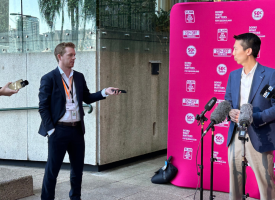Professor Steve Robson on ABC Drive - Private Health Insurance
Transcript: AMA President, Professor Stephen Robson, Outlet: ABC Drive, Tuesday, 22 August 2023
Subject: Private health insurance

STEVE ROBSON: Our system is very important because the majority of planned surgery is done in private hospitals and private day surgery centres. So the government has a set of incentives to force or guide people to take out private health insurance, and that's designed to take the pressure off our public hospitals. And we know that there are enormous strains on the resources and the capacity in public hospitals. It's a system that plays a very, very important role at the moment, but a lot of the policy settings have been in place for many years now haven't been adjusted for a while, and we're beginning to see some cracks appear in things and some unfairnesses. So it's really important the government is taking a look again and looking how it can make the system more equitable and serve the country better.
LAURA TCHILINGUIRIAN: You've said it's been put on set and forget. Where is it failing?
STEVE ROBSON: At the moment, because of a lack of indexation and a lack of looking at the settings for a long time, things have drifted along and it really seems to be negatively impacting on people on lower incomes. They're facing a greater penalty and, so at the moment, we need to make sure that anybody who wishes to take out private health insurance has a fair and equitable chance of doing that. The government's review at the moment is a great way of looking at resetting the way things are done and how they're adjusted. We think it's actually time for an independent umpire — a private health system authority — to take the heat out of a lot of these things, take the politics out of things, and make sure that all Australians get a fair deal. And of course, the government who is supporting the private health insurance through these rebates and incentives gets good value for money from private health insurers as well.
LAURA TCHILINGUIRIAN: And you've made this part of your submission to the Department of Health and Aged Care Review. What would a private health system authority actually have the power to do?
STEVE ROBSON: Well, at the moment, things tend to be a free for all. At a time when we see conflict between, for example, insurers, the private hospitals who provide the care where doctors look after and operate on patients, device manufacturers, so if you have a hip replacement or other sort of implant, there's a lot of factors at play and a lot of conflict between all the players at the moment. And it's very hard to navigate a path that's equitable, and we've got to put the patient at the centre of all this. So we certainly feel that it's time that an independent arbitrator, an independent kind of umpire is there to help negotiate all of these things, make sure the patients are always at the forefront and it's not for profit by the private health insurers or other players in this that's at the forefront. It's always patient care, and having an independent arm's length arbiter, a private health system authority, is long overdue and hopefully will put a bit of sense back into things.
LAURA TCHILINGUIRIAN: How has the Medicare levy surcharge impacted the uptake of private health insurance and how do you go about finding the right balance there?
STEVE ROBSON: So for a long time it served Australians very well. In fact we've seen after some concerns, pre-pandemic, that there has been a slight increase in the number of Australians who have private health insurance and part of that is probably driven by concerns about the huge problems in accessing care in public hospitals. But it's a potentially fragile system and we know that if older people or people with complex problems take out health insurance just long enough to have a procedure, then give it up again after the procedure, it's going to be a big problem for sustainability in the long term. We need to make sure that for Australians who want to have a baby, people who have psychiatric problems, who may need inpatient care, that they have a sustainable, affordable pathway for these things that takes pressure off the public system in the long term. It has to be sustainable, and it has to be all about patients and making sure they can access the care that they need in an affordable way, and they don't have to seek care in the overloaded public system if it's possible to avoid it.
LAURA TCHILINGUIRIAN: What's your advice to someone who is concerned that private health is just getting so outrageously expensive that they just can't justify it anymore?
STEVE ROBSON: It's a really important question. We've seen potential increases from some insurers of up to 8 per cent, which is an enormous slug for Australian families, and it's really pushing private health insurance out of the affordability range for many, many Australians now. And that's obviously a huge problem for the system as a whole. The advice is to shop around, for Australians, to make sure that if you are looking at private health insurance, to take it out early because the incentives are there to make it more affordable the earlier that you take it out. But certainly shopping around at the moment is very important and taking into account your needs, your family needs, and looking around for a policy that's going to serve you well into the future. We hope that the government's new review of all this will actually help achieve all of those aims for people.
LAURA TCHILINGUIRIAN: Should high income earners be forced to purchase a gold or silver policy product to avoid having to pay the Medicare levy surcharge?
STEVE ROBSON: I think it's all about incentives and making sure that — people always respond to the carrots and the sticks that are in place — overall, I think it's about making sure that the average Australian, the person who potentially might need care, has access to care. We're not big fans of forcing people to do anything at all, but certainly making it an attractive investment for a family makes really good sense.
LAURA TCHILINGUIRIAN: Is the system too complex?
STEVE ROBSON: Well, for a long time it was very, very complex. There's been a huge effort to try to simplify things and to bring in the gold, the silver, and the bronze levels, and a huge amount of effort went into making that viable for people. But it's clear that that can't be left on set and forget either; that there's more work to be done yet to make sure these systems, once they're brought in, are actually working, they're providing what Australians want and what they need, and they're also serving the community as a whole. And making sure that the care that people think they're getting from their private health insurance policies actually works for them and achieves what they want. So it's not something you can set and forget, and we're really pleased that there's a look again at this to say, “well, look, how can we make this better, more sustainable, and at the end of the day, make it what patients need for their families?”
GLEN BATHOLOMEW: AMA President, Professor Steve Robson talking private health insurance with Laura Tchilinguirian.



